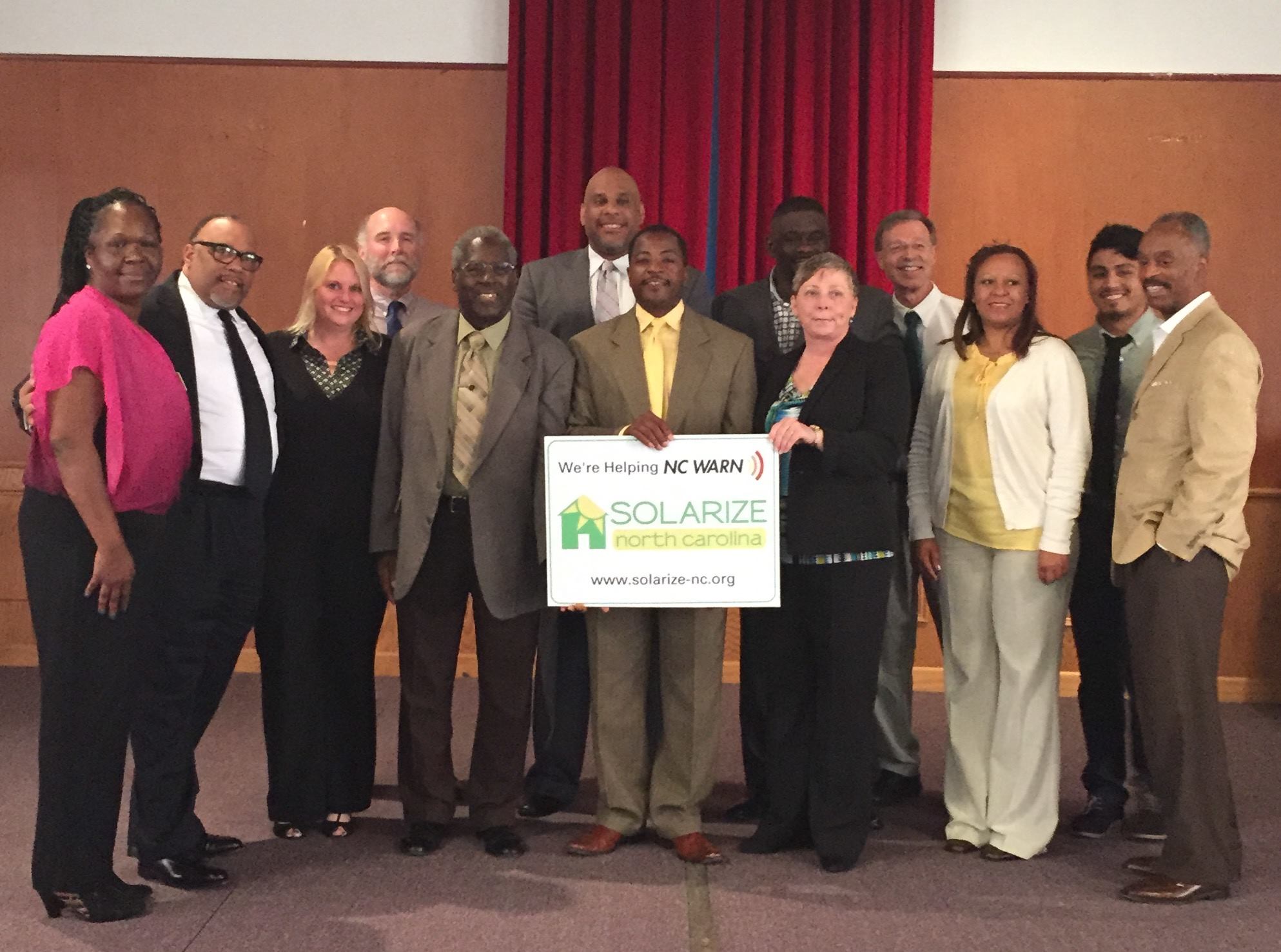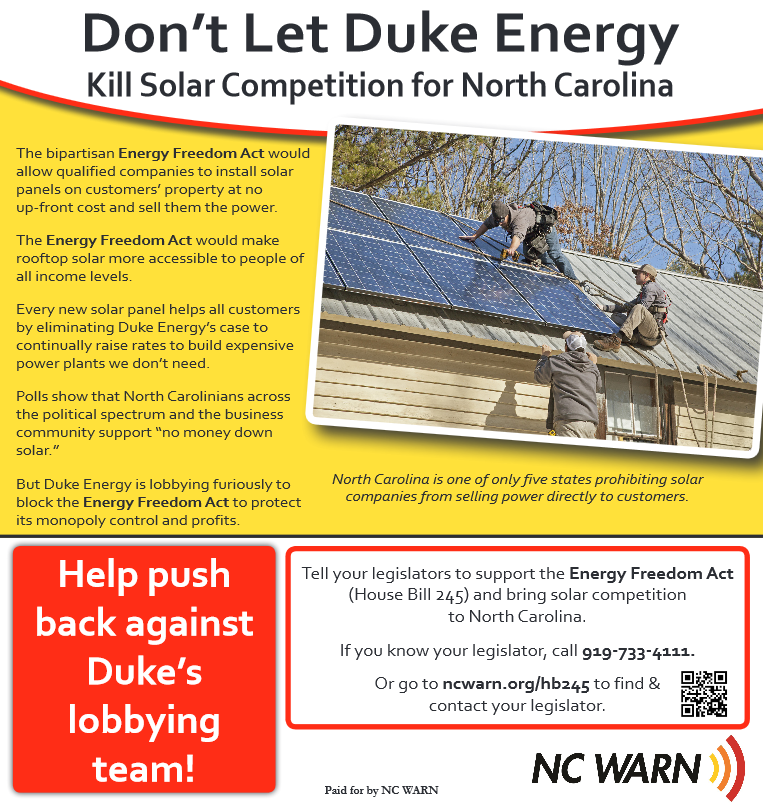Don’t Let Duke Energy Block Solar Competition in North Carolina!
The Energy Freedom Act (NC House Bill 245), introduced in 2015 by Rep. John Szoka (R-Cumberland County), would have opened up North Carolina electricity markets to third party sales of electricity (the “no money down” option that has long been available in states not dominated by monopoly utilities like Duke Energy).
HB 245 would have brought this affordable solar power to North Carolina. It had broad support on both sides of the aisle and was supported by big business like Wal-Mart and Target, but it never got out of committee because Duke Energy lobbied furiously against the bill, in order to protect its monopoly control over North Carolina.
|
Watch and Share!
|
Read the text of the 2015 bill and track its history
View and download our 2015 flyer on HB 245 and Third Party Solar
A poll commissioned by Conservatives for Clean Energy found that North Carolinians across the political spectrum support competition and clean solar power! View a summary of the poll or a PowerPoint with detailed results.
Read an April 7, 2015 letter to Duke Energy CEO Lynn Good from Reverend Nelson Johnson of the African-American Faith Community Church in Greensboro and NC WARN director Jim Warren asking Duke to stop targeting African-Americans with its anti-solar message.
See NC WARN’s fact sheet refuting Duke’s “Solar Hurts the Poor” arguments.
Background
North Carolina is one of only four states where solar companies are supposedly prohibited from installing solar systems on customers’ property for no up-front cost. Many states allow customers to purchase solar power generated on their own rooftops or lawns by panels owned by a qualified “third party” company. These companies are offering this “no money down solar” in states like Maryland, Pennsylvania, New Jersey, Massachusetts, New York and Arizona. But in North Carolina, Duke Energy is trying to block legislation allowing such “third party sales” to protect its monopoly control and prevent competition and customer choice.
Duke Energy claims that solar power harms low-income North Carolinians, but we have pointed out the flaws in their argument. The Energy Freedom Act would make solar accessible to people of all income levels.
How “No Money Down Solar Power” Works:
- The installer pays for, owns and often maintains the rooftop or ground-mounted system on the customer’s property and sells solar power to the customer at a fixed rate that’s lower than power from the utility.
- As prices for utility power keep rising, the cost of the solar energy is locked in.
- The customer continues buying power from the grid at the regular utility price to supplement the solar system.
- At the end of the agreement period (usually 5 to 20 years) the customer can often purchase the system or renew the agreement.

The Ministers Conference of Winston-Salem & Vicinity hold a press conference April 10, 2015 in support of the Energy Freedom Act. Click image for details.
Resources
NC WARN flyer on House Bill 245 and Third Party Sales
News & Observer op-ed by Rev. Nelson Johnson and NC WARN Director Jim Warren on the importance of the Energy Freedom Act
Charlotte Business Journal articles on the 2015 introduction of House Bill 245 and Duke Energy’s efforts to squash it
INDY Week article on the importance of House Bill 245
North Carolina Sustainable Energy Association’s news release supporting House Bill 245
NC WARN news release about statewide poll showing huge bipartisan support for solar & electricity competition in NC
NC WARN issue brief Debunking Duke Energy’s Claim that Solar Power Harms Low-income Carolinians NAACP resolution in February 2015 promoting equitable access to clean energy alternatives
Washington Post article on utilities plotting against solar around the country.
NC WARN’s Duke Hates Solar campaign exposing Duke Energy’s various strategies for slowing solar growth in North Carolina
More Solar Legislation
The Energy Investment Act (NC Senate Bill 447) would have extended North Carolina’s 35% renewable energy tax credit, which expired at the end of 2015. The bill would have extended the tax credit by five years for smaller renewable energy systems and by two years for systems larger than 1 megawatt. Since it was first passed, the renewable energy tax credit has had a huge impact on the North Carolina economy and the state’s clean energy progress. Over $2.6 billion invested in clean energy within the state from 2007 to 2014 has resulted in a total impact of over $4.7 billion back into the North Carolina economy.
Unfortunately, the bill did not pass, nor did subsequent efforts to extend the credit as part of the 2016 budget process. The failure of the legislature to extend the tax credit threatens the future of the NC solar industry, which — with a huge boost from the state tax credit — has created over 4,300 North Carolina jobs. Read the bill here.
Recent News
NO DEALS FOR DUKE ENERGY GAS EXPANSION — STATEMENT FROM NC WARN
Newly announced settlement negotiations are deeply troubling in carbon plan fight. Late today, the NC Utilities Commission was openly told that negotiations are underway among select parties that could settle the highly contentious carbon plan case that’s in its second week of hearings.
SEE ALL Duke/Kochs' Control of Government POSTSNC Republican leader: Duke Energy has too much political power — News and Observer Oped by R. LEE CURRIE JR.
McClatchy’s recent eye-opening investigative reporting on Duke Energy’s lavish campaign contributions intended to influence elected state lawmakers should alarm conservatives, moderates and liberals alike — for it’s a tale of chronic abuse of corporate power at the expense of millions of financially-strapped consumers.
SEE ALL Duke/Kochs' Control of Government POSTS
